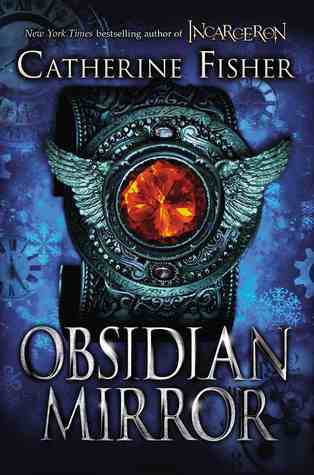
Chronoptika Series Book #1, Firebird, 2014, 378 pgs.
An angry schoolboy searches for his father’s murderer. A desperate girl jumps back in time to attempt to stop the man who will one day rule the world with uncanny magic. One scientist from the 1800’s studies a strange artifact for power, while another from the modern day looks to it to save his lost wife. A boy captured by the fair folk plots to make his escape, a girl tries to protect the stranger she fell in love with, and a teacher follows his student into danger. And through it all runs the oppressive presence of the Obsidian Mirror. The Mirror can drag you back through time, open to you worlds that you’ve never seen. It can give you a second chance to put things right, find what you’re searching for, but it only works one way. If you make the choice to use it you may never get home again.
This is, to put it bluntly, a very strange book for me.
Given, this may be because, in general, Obsidian Mirror is actually sort of a strange book for Catherine Fisher. It’s not quite off to the extent that it feels like a novel written by someone else; there are plenty of her hallmarks here, written with her typical grace. There are also plenty of things that always made her writing pop for me that are just missing from this novel, though.
I mean, overall I think I liked it. I’m interested in the rest of the series, at least, if I can ever track them down out of what seems to be half in-print obscurity.
(As an aside, how? The final book only came out last year, and Fisher’s a decently known author.)
Like I said, though, this is a very strange novel for her. I’m not sure if it’s her as a writer trying out something different or if the mostly modern-day setting necessitates something other from her previous pieces, which were typically set in completely alternate worlds. We’re retreading a little too much for it to be the former, though, I think.
That sounds like a criticism, but isn’t really. Most of the retread here consists of things that drew me to Fisher’s work in the first place. We have the typical cast of angry young people, hopeless dreamers, and gruff mentors that I always like so much more than the perfectly good, perfectly righteous protagonists of other YA series. We have a nice central mystery set up; as per usual there’s something dark at the heart of this story that the readers aren’t privy to yet. We even have the same sort of in media res that started the last two series I’ve read of hers. Again, this is a good thing. It gets the action going quickly and I’ve always liked having to figure out the rules of a world on my own.
And beyond the typical things that I appreciate about her work, there’s enough new that’s good that I can’t just write this book off.
Our usual cast is fleshed out with the constantly cheerful teenager, Rebecca and the stoic but caring teacher, Wharton, both of whom are blessedly normal people who get dragged into the fantastical crazy. They’re character archetypes I’ve never even seen Fisher touch on, and they’re definitely products of the more modern setting.
And while I may miss the beautifully detailed, infinitely strange worlds of her previous pieces, Fisher doesn’t fare too badly writing what is essentially urban fantasy. Or, more specifically, writing any of the story types she’s pushed together here. The Victorian mad scientists feel convincingly penny dreadful-like, and the futuristic dystopia is suitably terrifying and horrific. Ditto the murder mystery, and the fairy story, and the tragic love angle. All of the genres she’s playing with here really do feel like their own individual entities with their own characteristics.
Which is, on some level, the main problem with the book. I like all the components here, but taken together as a whole this is far more disjointed than anything else I’ve seen from this author. As you can probably tell from that summary up there, I’m having a hard time even describing how they all connect. I’d normally say the choppiness is part and parcel of having so many different story types pushed into one place, but I’m not sure that’s actually the case here.
It’s not like Fisher’s never bashed competing ideas against each other to try to make them play nice before. Incarceron posited old-timey frippery and Mad Max anarchy as two sides of the same coin. Relic Master/Book of the Crow played what was, ultimately, straight science fiction as a fantastical quest to awaken lost gods and save the world. Her play with vastly different genres is a huge part of what makes her writing interesting.
But both of those series felt like fully-fleshed, cohesive worlds from their very openings. This is far more jumbled, and I’m not sure whether it’s because there are so many characters to juggle, or whether it’s because the lack of a new world for the author to flesh out means the lack of a single unifying conflict. Either way it’s honestly a little confusing; I feel like I only halfway understand how all the storylines and the characters in them fit together. There’s just so much going on here that it’s hard for everything to gel in the space of one book, even if, so far as I can tell, the ideas behind slamming it all together are sound.
Which, aside from Fisher’s consistently lovable characters, is probably the novel’s one saving grace. I get the themes she’s pulling on to bring all these disparate ideas together. What do fairy courts with human captives, Victorian mad scientists, and time travelers coming back to prevent future despots all have in common?
Well, on some level they all deal with time and our experience of it, with questions of what human morality means in the grand scheme of things, and with how those two problems work together in our experience of the world. They’re all genres that play around with the fabric of reality. Again, I think I see part of where she’s going with it. And these questions are the stuff of really unique, timeless works. If she can make all of the storylines function more as a single unit in the next couple of books, this series could turn out spectacularly.
For now, though, the lack of cohesion makes this first novel a little hard to read. The ideas are there, but the execution falls down at points.

